Yinxiao Liu
Beyond Markovian: Reflective Exploration via Bayes-Adaptive RL for LLM Reasoning
May 26, 2025Abstract:Large Language Models (LLMs) trained via Reinforcement Learning (RL) have exhibited strong reasoning capabilities and emergent reflective behaviors, such as backtracking and error correction. However, conventional Markovian RL confines exploration to the training phase to learn an optimal deterministic policy and depends on the history contexts only through the current state. Therefore, it remains unclear whether reflective reasoning will emerge during Markovian RL training, or why they are beneficial at test time. To remedy this, we recast reflective exploration within the Bayes-Adaptive RL framework, which explicitly optimizes the expected return under a posterior distribution over Markov decision processes. This Bayesian formulation inherently incentivizes both reward-maximizing exploitation and information-gathering exploration via belief updates. Our resulting algorithm, BARL, instructs the LLM to stitch and switch strategies based on the observed outcomes, offering principled guidance on when and how the model should reflectively explore. Empirical results on both synthetic and mathematical reasoning tasks demonstrate that BARL outperforms standard Markovian RL approaches at test time, achieving superior token efficiency with improved exploration effectiveness. Our code is available at https://github.com/shenao-zhang/BARL.
Improve Mathematical Reasoning in Language Models by Automated Process Supervision
Jun 05, 2024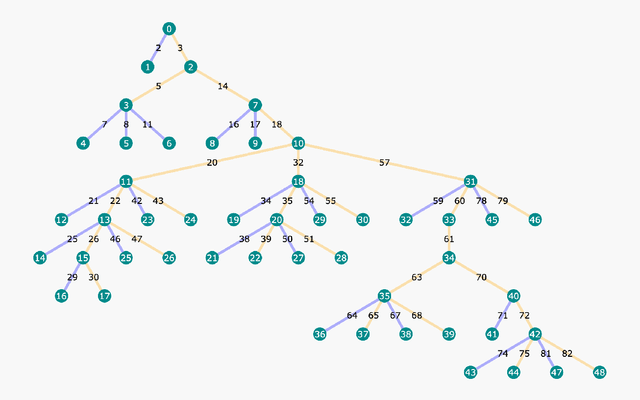

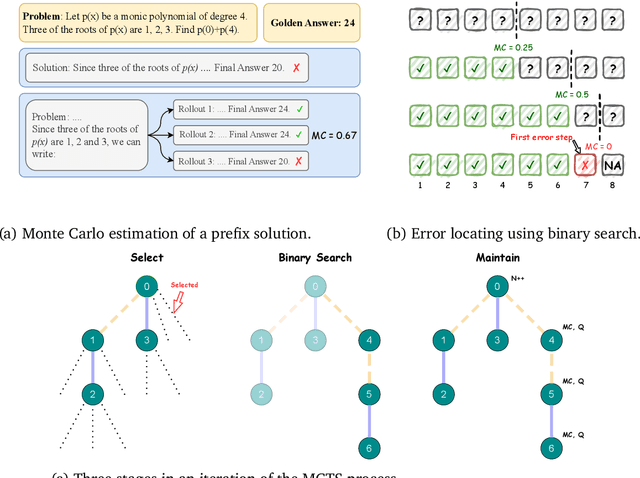
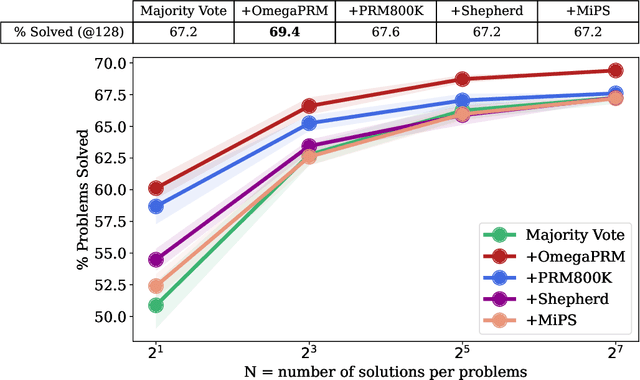
Abstract:Complex multi-step reasoning tasks, such as solving mathematical problems or generating code, remain a significant hurdle for even the most advanced large language models (LLMs). Verifying LLM outputs with an Outcome Reward Model (ORM) is a standard inference-time technique aimed at enhancing the reasoning performance of LLMs. However, this still proves insufficient for reasoning tasks with a lengthy or multi-hop reasoning chain, where the intermediate outcomes are neither properly rewarded nor penalized. Process supervision addresses this limitation by assigning intermediate rewards during the reasoning process. To date, the methods used to collect process supervision data have relied on either human annotation or per-step Monte Carlo estimation, both prohibitively expensive to scale, thus hindering the broad application of this technique. In response to this challenge, we propose a novel divide-and-conquer style Monte Carlo Tree Search (MCTS) algorithm named \textit{OmegaPRM} for the efficient collection of high-quality process supervision data. This algorithm swiftly identifies the first error in the Chain of Thought (CoT) with binary search and balances the positive and negative examples, thereby ensuring both efficiency and quality. As a result, we are able to collect over 1.5 million process supervision annotations to train a Process Reward Model (PRM). Utilizing this fully automated process supervision alongside the weighted self-consistency algorithm, we have enhanced the instruction tuned Gemini Pro model's math reasoning performance, achieving a 69.4\% success rate on the MATH benchmark, a 36\% relative improvement from the 51\% base model performance. Additionally, the entire process operates without any human intervention, making our method both financially and computationally cost-effective compared to existing methods.
Accelerating Inference of Retrieval-Augmented Generation via Sparse Context Selection
May 25, 2024



Abstract:Large language models (LLMs) augmented with retrieval exhibit robust performance and extensive versatility by incorporating external contexts. However, the input length grows linearly in the number of retrieved documents, causing a dramatic increase in latency. In this paper, we propose a novel paradigm named Sparse RAG, which seeks to cut computation costs through sparsity. Specifically, Sparse RAG encodes retrieved documents in parallel, which eliminates latency introduced by long-range attention of retrieved documents. Then, LLMs selectively decode the output by only attending to highly relevant caches auto-regressively, which are chosen via prompting LLMs with special control tokens. It is notable that Sparse RAG combines the assessment of each individual document and the generation of the response into a single process. The designed sparse mechanism in a RAG system can facilitate the reduction of the number of documents loaded during decoding for accelerating the inference of the RAG system. Additionally, filtering out undesirable contexts enhances the model's focus on relevant context, inherently improving its generation quality. Evaluation results of two datasets show that Sparse RAG can strike an optimal balance between generation quality and computational efficiency, demonstrating its generalizability across both short- and long-form generation tasks.
DRLC: Reinforcement Learning with Dense Rewards from LLM Critic
Jan 14, 2024



Abstract:Reinforcement learning (RL) can align language models with non-differentiable reward signals, such as human preferences. However, a major challenge arises from the sparsity of these reward signals - typically, there is only one reward for the entire generation. This sparsity of rewards can lead to inefficient and unstable learning. In this paper, we introduce a novel framework leveraging the critique ability of LLMs to produce dense rewards throughout the learning process. Our approach incorporates a critic language model alongside the policy model. This critic is prompted with the task description, question, policy model's output, and environment's reward signal as input, and provides token or span-level dense rewards that reflect the quality of each segment of the output. We assess our approach on three text generation tasks: sentiment control, language model detoxification, and summarization. Experimental results show that incorporating artificial dense rewards in training yields consistent performance gains over the PPO baseline with holistic rewards. Furthermore, in a setting where the same model serves as both policy and critic, we demonstrate that "self-critique" rewards also boost learning efficiency.
Fusion-Eval: Integrating Evaluators with LLMs
Nov 15, 2023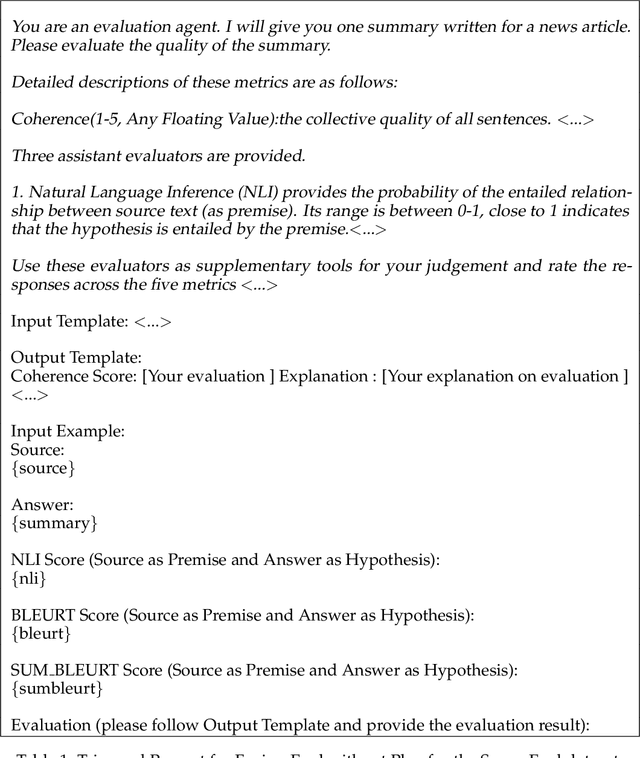
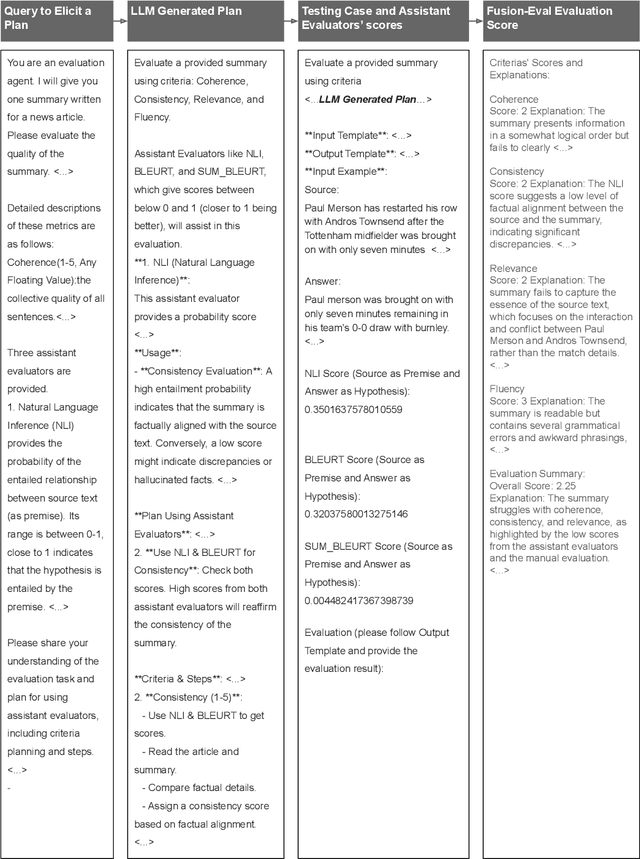
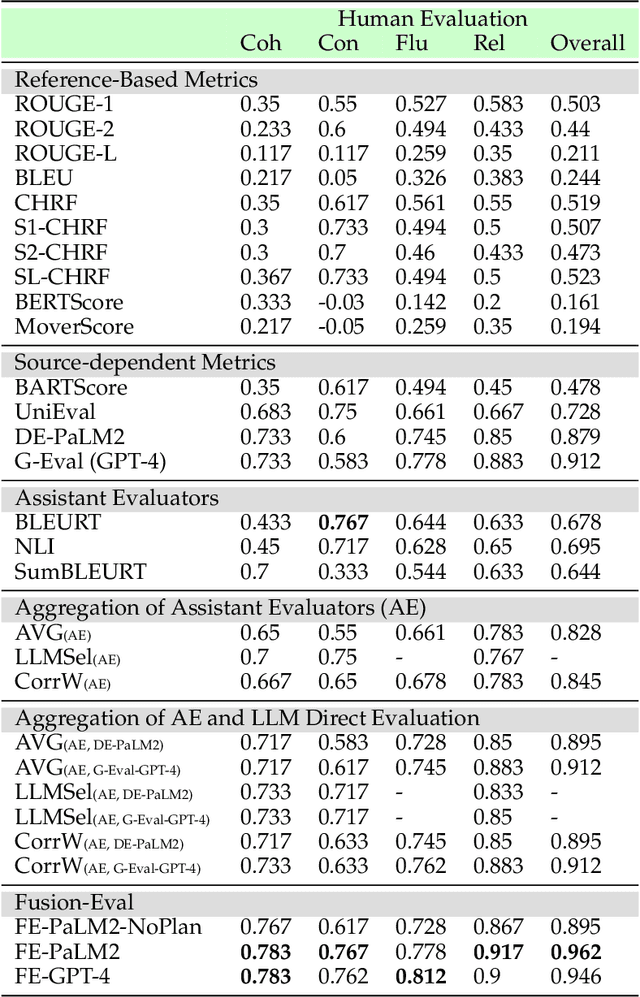
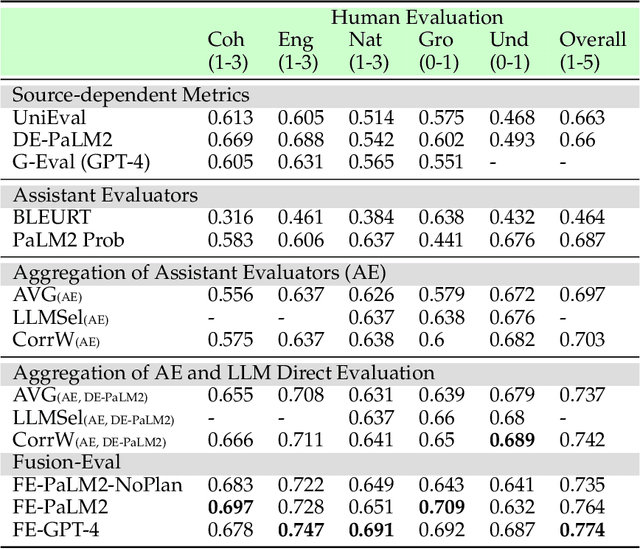
Abstract:Evaluating Large Language Models (LLMs) is a complex task, especially considering the intricacies of natural language understanding and the expectations for high-level reasoning. Traditional evaluations typically lean on human-based, model-based, or automatic-metrics-based paradigms, each with its own advantages and shortcomings. We introduce "Fusion-Eval", a system that employs LLMs not solely for direct evaluations, but to skillfully integrate insights from diverse evaluators. This gives Fusion-Eval flexibility, enabling it to work effectively across diverse tasks and make optimal use of multiple references. In testing on the SummEval dataset, Fusion-Eval achieved a Spearman correlation of 0.96, outperforming other evaluators. The success of Fusion-Eval underscores the potential of LLMs to produce evaluations that closely align human perspectives, setting a new standard in the field of LLM evaluation.
Critique Ability of Large Language Models
Oct 07, 2023

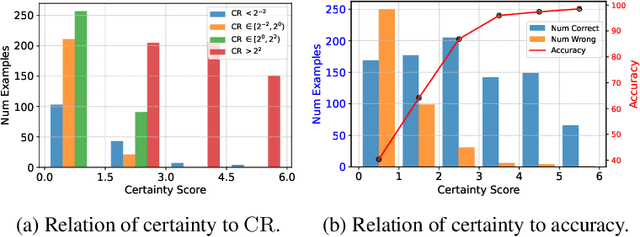

Abstract:Critical thinking is essential for rational decision-making and problem-solving. This skill hinges on the ability to provide precise and reasoned critiques and is a hallmark of human intelligence. In the era of large language models (LLMs), this study explores the ability of LLMs to deliver accurate critiques across various tasks. We are interested in this topic as a capable critic model could not only serve as a reliable evaluator, but also as a source of supervised signals for model tuning. Particularly, if a model can self-critique, it has the potential for autonomous self-improvement. To examine this, we introduce a unified evaluation framework for assessing the critique abilities of LLMs. We develop a benchmark called CriticBench, which comprises 3K high-quality natural language queries and corresponding model responses; and annotate the correctness of these responses. The benchmark cover tasks such as math problem-solving, code completion, and question answering. We evaluate multiple LLMs on the collected dataset and our analysis reveals several noteworthy insights: (1) Critique is generally challenging for most LLMs, and this capability often emerges only when models are sufficiently large. (2) In particular, self-critique is especially difficult. Even top-performing LLMs struggle to achieve satisfactory performance. (3) Models tend to have lower critique accuracy on problems where they are most uncertain. To this end, we introduce a simple yet effective baseline named self-check, which leverages self-critique to improve task performance for various models. We hope this study serves as an initial exploration into understanding the critique abilities of LLMs, and aims to inform future research, including the development of more proficient critic models and the application of critiques across diverse tasks.
Towards an On-device Agent for Text Rewriting
Aug 22, 2023



Abstract:Large Language Models (LLMs) have demonstrated impressive capabilities for text rewriting. Nonetheless, the large sizes of these models make them impractical for on-device inference, which would otherwise allow for enhanced privacy and economical inference. Creating a smaller yet potent language model for text rewriting presents a formidable challenge because it requires balancing the need for a small size with the need to retain the emergent capabilities of the LLM, that requires costly data collection. To address the above challenge, we introduce a new instruction tuning approach for building a mobile-centric text rewriting model. Our strategies enable the generation of high quality training data without any human labeling. In addition, we propose a heuristic reinforcement learning framework which substantially enhances performance without requiring preference data. To further bridge the performance gap with the larger server-side model, we propose an effective approach that combines the mobile rewrite agent with the server model using a cascade. To tailor the text rewriting tasks to mobile scenarios, we introduce MessageRewriteEval, a benchmark that focuses on text rewriting for messages through natural language instructions. Through empirical experiments, we demonstrate that our on-device model surpasses the current state-of-the-art LLMs in text rewriting while maintaining a significantly reduced model size. Notably, we show that our proposed cascading approach improves model performance.
 Add to Chrome
Add to Chrome Add to Firefox
Add to Firefox Add to Edge
Add to Edge